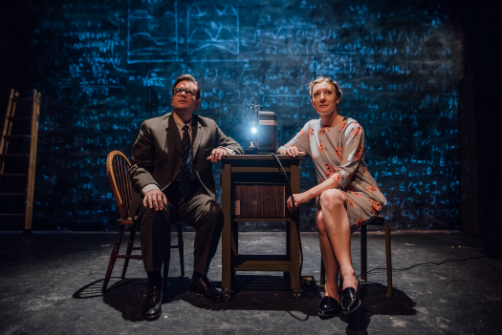
Secret Life of Humans
By David Byrne; Directed by David Byrne & Kate Stanley
Produced by New Diorama Theatre, in co-production with Greenwich Theatre
Off Broadway, Play
Runs through 7.1.18
59E59 Theaters, 59 East 59th Street
by Ran Xia on 6.13.18
 Richard Delaney and Olivia Hirst in Secret Life of Humans. Photo by David Monteith Hodge.
Richard Delaney and Olivia Hirst in Secret Life of Humans. Photo by David Monteith Hodge.
BOTTOM LINE: A blind date between an anthropologist and a famous scientist's grandson triggers a cascade of big questions in this stunning production.
"What does it mean to be human?" When a play tries to tackle such a question, it may make you suspicious. Will it be unnecessarily grand, vague, or pedantic? After all, the promotional materials mention Yuval Harari's Sapiens: A Brief History of Humankind (which is far from boring, but is massive). And included in the dramatis personae is Jacob "Bruno" Bronowski, mathematician and British television personality. I feared intellectual debates and history lessons, flavored with some intriguing concepts. What I did not expect was how Secret Life of Humans would touch me in a most personal and deeply emotional way. So here I am recalling every detail from this visually stunning, highly innovative production of an exquisitely crafted drama, asking my own question: "Where to begin?"
So asks the anthropologist Ava (Stella Blue Taylor), who starts the play delivering a lecture on the subject of vestigial traits—"from the Latin 'vestigia,' meaning 'footprints'"—amongst other things. But the story doesn't really start there; rather, it unwinds and extends forwards and backwards like an accordion, as playwright David Byrne threads multiple timelines, with absolute clarity, into an ambitious examination of human inheritance.
It starts with Ava's last lecture before her department is shut down, where she questions Jacob Bronowski's overly optimistic view on human advancement. It starts with a televised interview from 1974, where Michael Parkinson converses with Bronowski (Richard Delaney)—"Call me 'Bruno,' everybody does!"—right before Bronowski's unexpected death. It starts with a fateful blind date, which brings Ava to the late Bronowski's former home: how could she have known that the bloke she'd swiped right on would turn out to be the grandson of a scientist whose secret stash of papers might save her career?
And thus a previously unknown side of Bruno emerges from beyond the grave, as Jamie (Andrew Strafford-Baker) and Ava open up those sealed boxes from 70 years ago. Two people going through a stack of papers has never been made so dynamic; each clue animates an episode from the past. We see Bruno in his early days as a lecturer at the University of Hull, his ambition stifled by his Jewish, immigrant roots. "I love this country. But it’s an unrequited love. What can I do? I’m unwanted, but to leave is unimaginable. So here I am. Stuck on the outside," Bruno laments. Then George (Andy McLeod), a young mathematician working for the British government, offers him a chance to truly thrive, to become irreplaceable. But of course, the cost of becoming a war scientist is high: "The honorable thing. Dying for your country. But nobody ever talks about killing for it." What is a scientist to do when his calculations are used to perfect the parabolas of mass destruction? Is this progress? Ava raises the question again, conversing across time and space with a more disillusioned Bruno.
The production, directed by Byrne and Kate Stanley, features a team of skilled actors, with Delaney's portrayal of of the charismatic Bruno an absolute highlight; his emotional journey will surely tug on anyone's heartstrings. His grieving wife, Rita (Olivia Hirst), also offers a ethereal presence, in contrast with the more realistic scenes between Taylor's pragmatic Ava and Baker's endearing Jamie.
Zakk Hein's projection design is a crucial part of the production's impact. Like fading chalk on a blackboard, its images contextualize the play in a way that's at once subtle and magical. The modular set (designed by Jen McGinley) that reassembles into various spaces and atmospheric sound design (by Yaiza Varona) makes it easy to track the multiple timelines in the play. John Maddox's innovative aerial design offers a unique point of view: specifically, a bird's-eye view of humankind's past.
At 90 minutes, the play is rather short, but packs a massive punch. It's a cerebral experience, but I was moved to tears by the humanity of its relatable, flawed and complex characters. It is also the first play I've seen this year that I'd like to revisit, and savor the text for its literary value alone. Secret Life of Humans is not simple entertainment, nor does it stop at spectacle. Every element in the production is meticulously designed to fit in an elaborate scheme, and to leave you with more questions than you came in with.
(Secret Life of Humans plays at 59E59 Theaters, 59 East 59th Street, through July 1, 2018. The running time is 90 minutes with no intermission. Performances are Tuesdays through Fridays at 7 and Saturdays and Sundays at 2 and 7. Tickets are $70 and are available at 59e59.org.)
Secret Life of Humans is by David Byrne. Directed by David Byrne and Kate Stanley. Set Design is by Jen McGinley. Lighting Design is by Geoff Hense. Costume Design is by Ronnie Dorsey. Projection Design is by Zakk Hein. Composer and Sound Designer is Yaiza Varona. Aerial Design is by John Maddox. Production Stage Manager is Raynelle Wright.
The cast is Richard Delaney, Olivia Hirst, Andy McLeod, Andrew Strafford-Baker, and Stella Blue Taylor.

